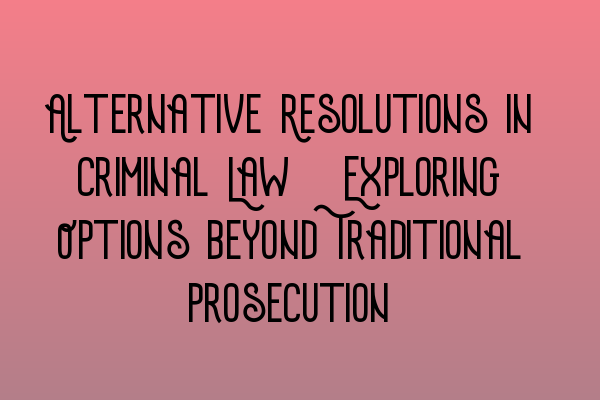Alternative Resolutions in Criminal Law: Exploring Options beyond Traditional Prosecution
In the world of criminal law, the traditional path of prosecution is not always the most effective or efficient means of resolution. While criminal trials can be essential for upholding justice and ensuring public safety, there are alternative resolutions that can offer a different approach to dealing with criminal offenses.
1. Restorative Justice
One alternative resolution that has gained traction in recent years is restorative justice. Restorative justice focuses on repairing the harm caused by a crime by bringing together the victim, the offender, and the community. Through facilitated dialogue, the parties involved have the opportunity to express their feelings, understand the impact of the crime, and work towards a resolution that meets the needs of all parties.
Restorative justice offers a more collaborative and rehabilitation-focused approach to addressing criminal behavior. It aims to address the underlying issues that contribute to offending and prevent future criminal behavior. By giving the victim a voice and involving the community, restorative justice can provide a sense of closure and healing, while also promoting accountability and personal growth for the offender.
Demystifying the Solicitors Qualifying Examination Format
2. Diversion Programs
Diversion programs provide an alternative resolution for certain offenders, particularly those who are first-time or non-violent offenders. Instead of going through the traditional court process, eligible individuals are given the opportunity to participate in rehabilitation programs or community-based initiatives.
These programs aim to address the underlying causes of criminal behavior, such as substance abuse or mental health issues, while also holding individuals accountable for their actions. By diverting offenders away from the criminal justice system, diversion programs can help reduce recidivism rates and offer individuals a chance to make positive changes in their lives.
LLC Formation Made Simple: Step-by-Step Guide for UK Entrepreneurs
3. Deferred Prosecution Agreements
Deferred prosecution agreements (DPAs) are another alternative resolution in criminal law. DPAs allow for the suspension of criminal charges against a corporation or organization in exchange for compliance with certain conditions, such as fines, restitution, or implementing internal reforms.
DPAs are often used in cases involving corporate misconduct, where the prosecution seeks to hold the organization accountable without causing extensive harm to innocent employees or stakeholders. By offering an alternative to prosecution, DPAs encourage cooperation, corporate responsibility, and the possibility of rehabilitation for the organization.
Business Regulations in the UK: A Comprehensive Overview
4. Plea Bargaining
Plea bargaining is a well-known alternative resolution in criminal law, where the prosecution and the defense negotiate a plea agreement. This typically involves the defendant pleading guilty to lesser charges or receiving a reduced sentence in exchange for giving up their right to a trial.
Plea bargaining can save time and resources by avoiding a lengthy trial process. It can also provide some certainty for both the prosecution and the defense, as the outcome is agreed upon in advance. However, plea bargaining must be approached with caution to ensure that the defendant’s rights are protected and that the resolution is in the best interest of justice.
Preparing for the SQE Exam: Strategies and Resources for Success
5. Alternative Dispute Resolution
While often associated with civil cases, alternative dispute resolution (ADR) methods like mediation and arbitration can also be valuable in criminal law. ADR provides a less adversarial and more cooperative approach to resolving conflicts.
In criminal cases, ADR can be especially beneficial when there are disagreements over restitution or when the parties involved wish to explore possibilities for resolution outside of traditional prosecution. Mediation, for example, allows for open dialogue, understanding, and mutual agreement, which can lead to creative solutions that satisfy both the victim and the offender.
SQE Workshops and Webinars: Accelerate Your Exam Preparation
Exploring Alternative Resolutions in Criminal Law
It is essential to recognize that traditional prosecution may not always be the best approach to every criminal case. Alternative resolutions like restorative justice, diversion programs, deferred prosecution agreements, plea bargaining, and alternative dispute resolution can offer a more collaborative, rehabilitative, and efficient means of resolution.
By understanding and exploring these alternative options, criminal justice professionals can promote fairness, rehabilitation, and justice for both victims and offenders. The key is to find the most appropriate resolution based on the circumstances of each case, prioritizing the needs of the individuals involved, and preserving the integrity of the criminal justice system.
